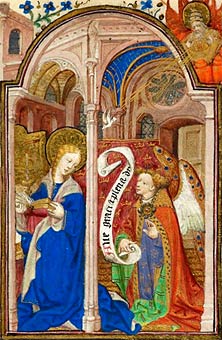|
|
|
|


Annunciation from 'The Dunois Hours', c1450.
:: Nowell, nowell, nowell,
this is the salutacion
of the aungell Gabriell ::
|
Tydynges trew ther be cum new, sent frome the Trynyte,
Be Gabriel to Nazaret, cite of Galile;
A clene mayden and pure virgyn thorow hyre humilite,
Conceyvid the secunde person in divinite.
:: Nowell, nowell, nowell, &c. ::
|
Whan he fyrst presentid was before hyr fayer visag,
In the most demuer and goodly wys he ded to hyr omag,
And seid, Lady, frome heven so hy, that lordes herytag,
The wich off the borne wold be, I am sent on messag.
:: Nowell, nowell, nowell, &c. ::
|
Hayle, virgyne celestial, the mekest that ever was;
Hayle, temple of deite and myrrour off all grace;
Hayle, virgyne puer, I the ensure within full lyty[l] space,
Thou shalt receyve and hym conceyve that shal bryng gret solace.
:: Nowell, nowell, nowell, &c. ::
|
Sodenly she, abashid truly, but not al thyng dysmaid,
With mynd dyscret and mek spyryt to the aungell she said:
By what maner shuld I chyld bere, the wich ever a maid
Have lyvid chast, al my lyf past, and never mane asaid?
:: Nowell, nowell, nowell, &c. ::
|
Than ageyne to hire certeyn answered the aungell,
O lady dere, be off good chere, and dred the never a dell,
Thou shalt conceyve in thi body, mayden, very God hym self,
In whos byrth heven and erth shal joy, callid Emanuell.
:: Nowell, nowell, nowell, &c. ::
|
Not it, he seid, vj. monethys past, thi cosyn Elyzabeth,
That was barren, conceyvid sent Johan, tru it is that I tell;
Syn she in ag, why not in yought mayst thou conceyve as well,
If God wyl, whome is possybyll to have don every dell?
:: Nowell, nowell, nowell, &c. ::
|
Thane ageyne to the aungell she answered womanly,
What ever my lord commaund me do, I wyll obey mekely,
Ecce sum humilima ancilla Domini,
Secundum verbum tuum, she seid, fiat mihi.
:: Nowell, nowell, nowell
this is the salutacion
of the aungell, Gabriell :: |
[1450-70?]
|
[AJ Notes:]
cum new, newly come.
Be Gabryell, by Gabriel.
goodly wys, goodly manner.
omag, homage.
The wich off the borne wold be, which would of thee be born.
mane asaid, man assayed.
dred the never a dell, fear thou not a bit.
sent Johan, St. John.
Syn she in ag, since she in old age.
every dell, everything; all.
Ecce sum humilima ancilla Domini, I am the humblest handmaid of the lord.
Secundum verbum tuum, according to your word.
fiat mihi, be it done unto me.
 |
"Nowell, Nowell, Nowell" Sheet Music |
 |
Manuscript image of Bodleian MS Eng. Poet. e. 1. f. 41v-42r. |
Text Source:
Early English Poetry, Ballads, &c. Vol XXIII. T. Wright, Ed.
London: Percy Society, 1848. 79-81.
 | to Middle English Lyrics |
 | to Luminarium Main |
 | to Middle English Literature |
Site copyright ©1996-2018 Anniina Jokinen. All Rights Reserved.
Created by Anniina Jokinen on May 22, 2011. Last updated November 21, 2018.
|
|
Middle English Literature
Geoffrey Chaucer
John Gower
Sir Gawain and the Green Knight
William Langland / Piers Plowman
Julian of Norwich
Margery Kempe
Thomas Malory / Morte D'Arthur
John Lydgate
Thomas Hoccleve
Paston Letters
Everyman
Medieval Plays
Middle English Lyrics
Essays and Articles
Sciences
Medieval Cosmology
Historical Events and Persons
Hundred Years' War (1337-1453)
Edward III
Edward, Black Prince of Wales
Lionel of Antwerp, Duke of Clarence
John of Gaunt, Duke of Lancaster
Edmund of Langley, Duke of York
Thomas of Woodstock, Gloucester
Richard of York, E. of Cambridge
Richard II
Henry IV
Edward, Duke of York
Henry V
Thomas, Duke of Clarence
John, Duke of Bedford
Humphrey, Duke of Gloucester
Catherine of Valois
Charles VII, King of France
Joan of Arc
Louis XI, King of France
Charles the Bold, Duke of Burgundy
The Wars of the Roses (1455-1485)
Causes of the Wars of the Roses
The House of Lancaster
The House of York
The House of Beaufort
The House of Neville
Henry VI
Margaret of Anjou
Richard Plantagenet, Duke of York
Edward IV
Elizabeth Woodville
Edward V
Richard III
George, Duke of Clarence
More at Encyclopedia and at
Additional Medieval Sources
|
|